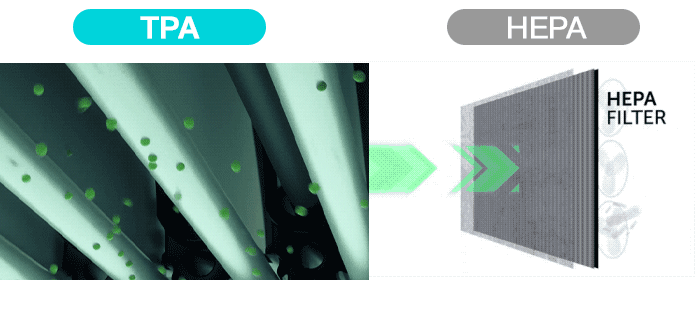Views: 300 Author: Site Editor Publish Time: 2023-10-07 Origin: Site








Air pollution is a serious concern, and according to the Environmental Protection Agency, the air inside our homes can be up to five times more polluted than the air outside. This is especially concerning for those who suffer from allergies, asthma, or other respiratory issues. Air purifiers can help to improve indoor air quality by removing allergens, dust, and other particles from the air. However, with so many different types of air purifiers on the market, it can be challenging to know which one is right for you.In this blog post,we'll compare two popular types of Air purifiers –ionic air purifiers VS HEPA air purifiers– to help you make an informed decision.
An ionic air purifier is a type of air cleaner that uses negatively charged ions to attract and trap airborne particles. These particles, which can include dust, mold, pollen, and other allergens, are then filtered out of the air.Ionic air purifiers work by emitting streams of negatively charged ions into the air. These ions attach to positively charged particles, such as dust and pollen, causing them to become heavy and fall to the ground. This process is known as electrostatic precipitation.
Ionic air purifiers are often marketed as being quiet and energy-efficient. Some models may also include a UV-C light, which is used to kill bacteria and viruses.
Many people maybe worried about safety ionic air purifiers. Because of the possible disadvantage of ionic air purifiers that they can produce ozone as a byproduct, which can be harmful to some people. You may want to know which air purifier does not produce ozone. But don't worry, many newer models are designed to minimize ozone output. Such as Airdog air purifiers which just produces minimal trace amounts of ozone just at 0.0021 ppm (parts per million) It is far below the CDC’s National Institute for Occupational Safety & Healthy (NIOSH) recommends ozone exposure limits of 0.1 ppm

There are several advantages to using an ionic air purifier for air filtration:
1. No filter replacements: Ionic air purifiers do not require filter replacements, which can save money over the long term.Such as Airdog X3,X5,X8 airpurifiers.
How to clean a ionic air purifier? Watch the Video —— Cleaning Guide of Airdog ionic air purifier
2. Odor removal: They may also be effective at removing some odors from the air.
3. Health benefits: Ionic air purifiers produce negative ions that are believed to have some health benefits, such as reducing stress and promoting better sleep.
Overall, an ionic air purifier can be a cost-effective and beneficial option for air filtration.
While both ionic and HEPA air purifiers are designed to clean the air, they work in different ways.
An ionic air purifier works by producing negatively charged ions that attract and trap airborne particles, such as dust and allergens. These particles become attached to positively charged surfaces in the room, such as walls, furniture, and curtains. Some ionic air purifiers also include a UV-C light to kill bacteria and viruses.
Also, it will help you save money in the long term. Such as Airdog X3, is equipped with the World's First Washable Filter which can help save over $500/year for the replacement cost of filters over the lifetime of the unit. It is even dishwasher-safe!
However, there are some drawbacks to using an ionic air purifier. One potential downside is that they can produce ozone as a byproduct, which can be harmful to some people. But you don't have to worry, more new machines generally only produce trace amounts of ozone.It's safe.
A HEPA air purifier, on the other hand, uses a physical filter to capture airborne particles. HEPA filters air purifier are designed to capture particles as small as 0.3 microns, including bacteria and viruses. This makes them more effective at cleaning the air in a room than an ionic air purifier.
You may ask if HEPA filters can be washed and reused. The answer is "NO". While HEPA air purifiers are typically more effective at capturing particles, they require the filters to be replaced periodically to continue working effectively. Depending on the model, owning a HEPA air purifier can add to the ongoing cost.

Pros | Cons | |
Ionic Air Purifiers |
|
|
HEPA Air Purifiers |
|
|
